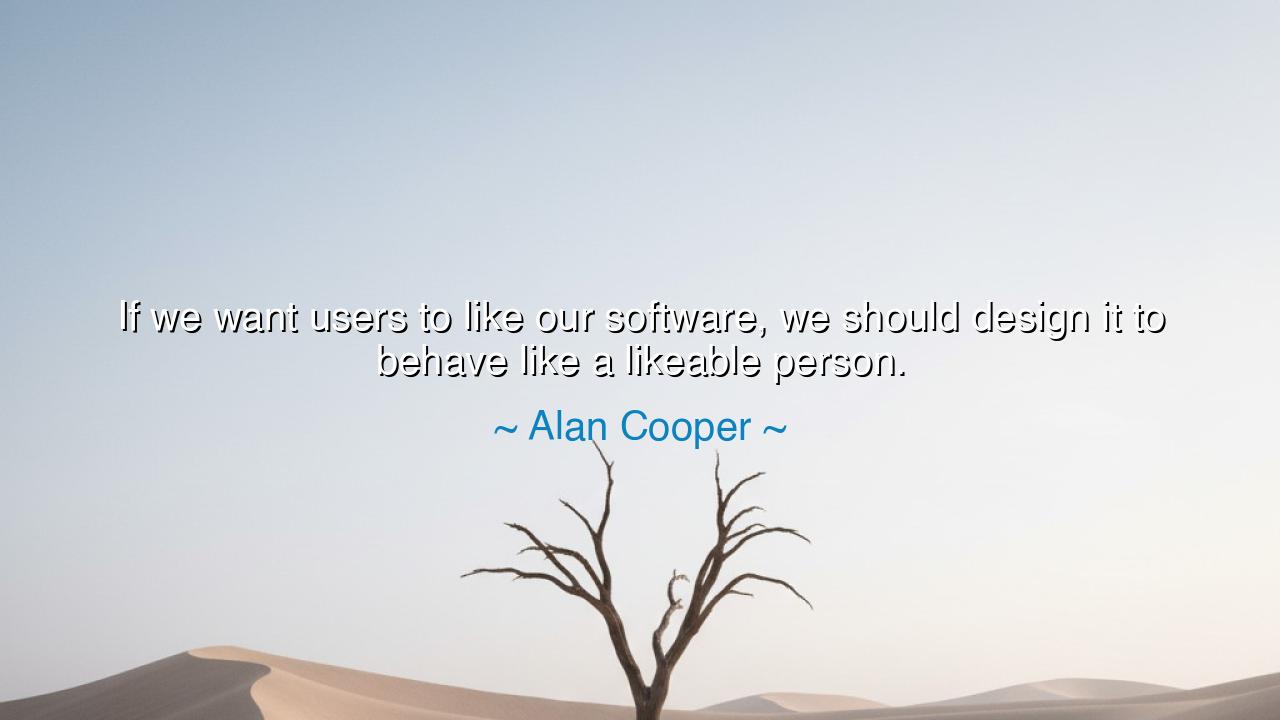
If we want users to like our software, we should design it to
If we want users to like our software, we should design it to behave like a likeable person.






When Alan Cooper, the father of Visual Basic and a pioneer of user experience, declared, “If we want users to like our software, we should design it to behave like a likeable person,” he spoke not of code and machinery, but of humanity itself. In this single sentence, Cooper bridged the world of logic and compassion, reminding us that behind every interface sits a living soul — not a number, not a function, but a person seeking to understand and be understood. His words carry a timeless wisdom: that technology, though forged in circuits and symbols, must still speak the language of empathy if it is to serve and endure.
In this, Cooper was not merely offering advice to designers; he was teaching a philosophy of creation. He saw that software, like any tool, reflects its maker’s mind. Coldly designed software frustrates, confuses, and alienates — it behaves like an arrogant host who speaks only of himself. But software that is gentle, clear, and patient — software that listens — behaves like a likeable person, one who invites trust and brings ease to those who meet it. Thus, the true art of design lies not in complexity, but in character — in crafting systems that act with grace, humility, and understanding.
Long before the age of screens, the ancients already knew this truth. The builders of great temples and the scribes of wisdom shaped their works not merely for function, but for harmony. The Greeks called it kalokagathia — the union of beauty and goodness. A well-made tool, they believed, should not only serve but delight. The same spirit guided the artisans of Japan, who forged the tea ceremony into a ritual of humility, where even the bowl and the room were designed to welcome the guest. Cooper’s insight, though cast in the digital age, draws from this ancient root: that good design is moral design, for it honors the human it serves.
Consider the story of Apple’s first Macintosh, launched in 1984. Steve Jobs, though no engineer in the strict sense, demanded that the machine “feel friendly.” He wanted the computer not to intimidate but to invite. It smiled upon startup; it greeted the user with warmth; it forgave small errors. This was not frivolity — it was human design. Jobs and his team understood, as Cooper later expressed, that the relationship between human and machine should mirror the best of human relationships: respectful, intuitive, and kind. It was this empathy — not mere innovation — that made the Macintosh a symbol of the future.
But Cooper’s words carry also a warning. To make software likeable, one must know people deeply — their frustrations, their habits, their silent hopes. A likeable person does not demand attention; he earns it. He does not force his will; he adapts. In the same way, great software must learn to disappear, to become an extension of its user’s intention. Every click, every message, every pause must reflect an understanding of how minds work and how hearts react. When technology forgets this — when it manipulates or overwhelms — it ceases to be a companion and becomes a tyrant.
Thus, Cooper’s teaching is not technical, but ethical. He asks us, the builders of tools and systems, to remember the human soul at the center of every design. In the rush toward innovation, he reminds us to pause and ask: “Would I want to spend time with this product if it were a person?” If the answer is no — if it feels rude, confusing, or self-centered — then it is not yet worthy of its purpose. For to design without empathy is to forget what makes creation noble.
And so, O learner and maker, take this lesson to heart: if you would craft something to be loved, let it first love those who use it. Study not only code, but kindness. Let your interfaces smile; let your systems forgive; let your creations speak with clarity and grace. In every design, let there be the echo of human warmth. For technology, no matter how advanced, will only uplift us when it learns, as Cooper taught, to behave like a likeable person — thoughtful, humble, and full of care.
For in the end, this is the true measure of mastery: not the brilliance of invention, but the humanity of its touch.






AAdministratorAdministrator
Welcome, honored guests. Please leave a comment, we will respond soon